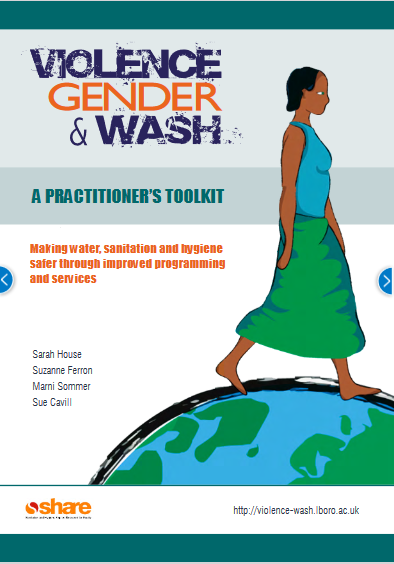toolkit
Violence, Gender and Wash: A Practitioner’s Toolkit – Making Water, Sanitation and Hygiene Safer Through Improved Programming and Services’
Author: Sarah House, Suzanne Ferron, Marni Sommer, Sue Cavill
Year: 2014
Publisher: WaterAid/SHARE
This toolkit has been developed in response to an acknowledgement that although the lack of access to
appropriate sanitation, hygiene and water services is not the root cause of violence, it can lead to increased vulnerabilities to violence of varying forms. Incidences have been reported from a wide range of contexts, often anecdotally but with regular occurrence, with a number of targeted studies confirming the same. By recognising both the risks of violence associated with WASH and the potential benefits of WASH it is hoped that the toolkit can shine a light on this problem and encourage practitioners to recognise their capacity to make WASH safer and more effective. Effectively considering gender in the process of
establishing sustainable WASH services can also contribute to the process of longer-term change in
attitudes and relationships between men and women. This in turn can contribute to a transformative process that can help reduce vulnerabilities to violence over the longer term. However, for WASH actors, particularly for those working in the longer-term developmental contexts, there has been a lack of clarity on the practical steps that can be taken so that they can contribute to reducing vulnerabilities through improved policy and programming. This toolkit aims to fill this gap.
Violence, Gender and Wash: A Practitioner’s Toolkit – Making Water, Sanitation and Hygiene Safer Through Improved Programming and Services’
External Link
Open linkRating
Would you like to see other resources here?
Give us your feedback"*" indicates required fields
Related Resources and Tools
Wash Safety and Accessibility Toolkit
This safety and accessibility rapid audit tool is based on visual observation as a means…
WASH for Peace Guidance and Tools
Integrating conflict sensitivity and peacebuilding approaches to WASH programming in fragile and conflict-affected contexts Despite…
Gender Equality and Social Inclusion Self-Assessment Tool
This guidance is for staff of water, sanitation and hygiene (WASH) implementation and research projectsand…
Water and Conflict: A Toolkit for Programming
This practical toolkit explains the connection between water management and key risk factors associated with…
Technical Brief: Climate Resilient Sanitation in Practice
Climate change is drastically changing the world we live in. It devastates lives, causes changes…
Monthly OPEX, Lime Stabilisation Pond
WASH Safety and Accessibility Toolkit
This toolkit is designed to provide practical monitoring mechanisms to track the quality and safety…
Biogas Technology Evaluation Tool
An Excel-based calculation tool that can be used in conjunction with the guide “Is biogas…
Oxfam Gender In Emergencies Standards
Oxfam’s 2022 Gender in Emergencies (GiE) Standards are the key internal tool by which we…
The IASC Gender With Age Marker
The IASC Gender with Age Marker (GAM) helps users to design and implement inclusive programs…
Humanitarian Aid Solid Waste Assessment and Improvement (HAWAI) Guidelines
The Humanitarian Aid Solid Waste Assessment and Improvement (HAWAI) Guidelines are designed to support effective Solid…
Planning for Zero-Waste at Schools - A Toolkit
This toolkit aims at providing step-by-step guidance accompanied by tools to develop and implement “Action…
An approach to transforming pit latrines into on-site faecal sludge treatment facilities
Video from the presentation at the Emergency Environmental Health Forum (EEHF) 2025 by Bara Wahbeh…
Gender In Emergencies Standards
Oxfam’s 2022 Gender in Emergencies (GiE) Standards are the key internal tool by which we…
Monthly OPEX Anaerobic Baffled Reactor
Wash Safety and Accessibility Toolkit
This safety and accessibility rapid audit tool is based on visual observation as a means…
WASH for Peace Guidance and Tools
Integrating conflict sensitivity and peacebuilding approaches to WASH programming in fragile and conflict-affected contexts Despite…
Gender Equality and Social Inclusion Self-Assessment Tool
This guidance is for staff of water, sanitation and hygiene (WASH) implementation and research projectsand…
Water and Conflict: A Toolkit for Programming
This practical toolkit explains the connection between water management and key risk factors associated with…
Technical Brief: Climate Resilient Sanitation in Practice
Climate change is drastically changing the world we live in. It devastates lives, causes changes…
Monthly OPEX, Lime Stabilisation Pond
WASH Safety and Accessibility Toolkit
This toolkit is designed to provide practical monitoring mechanisms to track the quality and safety…
Biogas Technology Evaluation Tool
An Excel-based calculation tool that can be used in conjunction with the guide “Is biogas…
Oxfam Gender In Emergencies Standards
Oxfam’s 2022 Gender in Emergencies (GiE) Standards are the key internal tool by which we…
The IASC Gender With Age Marker
The IASC Gender with Age Marker (GAM) helps users to design and implement inclusive programs…
Humanitarian Aid Solid Waste Assessment and Improvement (HAWAI) Guidelines
The Humanitarian Aid Solid Waste Assessment and Improvement (HAWAI) Guidelines are designed to support effective Solid…
Planning for Zero-Waste at Schools - A Toolkit
This toolkit aims at providing step-by-step guidance accompanied by tools to develop and implement “Action…
An approach to transforming pit latrines into on-site faecal sludge treatment facilities
Video from the presentation at the Emergency Environmental Health Forum (EEHF) 2025 by Bara Wahbeh…
Gender In Emergencies Standards
Oxfam’s 2022 Gender in Emergencies (GiE) Standards are the key internal tool by which we…
Monthly OPEX Anaerobic Baffled Reactor
Still have questions?
You could not find the information you were looking for? Please contact our helpdesk team of experts for direct and individual support.


